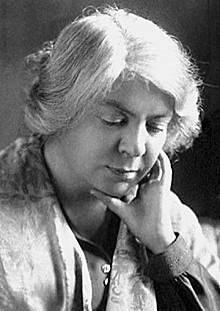Grazia Deledda | |
|---|---|
 Deledda in 1926 | |
| Native name | Gràssia Deledda Gràtzia Deledda |
| Born | Grazia Maria Cosima Damiana Deledda 27 September 1871 Nuoro, Italy |
| Died | 15 August 1936 (aged 64) Rome, Italy |
| Occupation | Writer, novelist |
| Literary movement | Realism, Decadence |
| Notable awards | Nobel Prize in Literature 1926 |
| Spouse |
Palmiro Madesani (m. 1900) |
| Children | Sardus Madesani (1901–1938) Francesco Madesani (1904–1981) |
| Signature | |
This article includes a list of references, related reading, or external links, but its sources remain unclear because it lacks inline citations. (December 2023) |
Grazia Maria Cosima Damiana Deledda (Italian: [ˈɡrattsja deˈlɛdda]; Sardinian: Gràssia or Gràtzia Deledda[1][2] [ˈɡɾa(t)si.a ðɛˈlɛɖːa]; 27 September 1871 – 15 August 1936) was an Italian writer who received the Nobel Prize for Literature in 1926[3] "for her idealistically inspired writings which with plastic clarity picture the life on her native island [i.e. Sardinia] and with depth and sympathy deal with human problems in general".[4] She was the first Italian woman to receive the prize, and only the second woman in general after Selma Lagerlöf was awarded hers in 1909.[5]
- ^ "Gràtzia Deledda". sardegnacultura.it (in Sardinian). Retrieved 17 May 2020.
- ^ Serra, Sarvadore (3 September 2016). "Gràssia Deledda, unu Nobel sardu a s'Itàlia". Limba Sarda 2.0 (in Sardinian). Retrieved 17 May 2020.
- ^ Grazia Deledda (Italian author). britannica.com
- ^ https://www.nobelprize.org/nobel_prizes/literature/laureates/1926/press.html Award speech, apparently citing the Swedish Academy.
- ^ Hallengren, Anders. "Grazia Deledda: Voice of Sardinia". Nobel Media. Retrieved 16 April 2014.